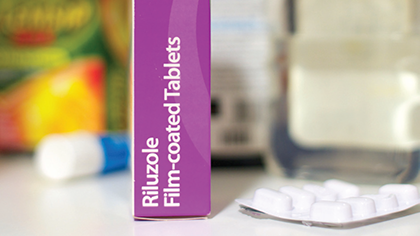Genetic testing for motor neurone disease
Our researchers developed diagnostic tests that led to the first child being born free of the genetic mutation which causes...
28 January 2015
Our researchers helped demonstrate that 100mg of riluzole a day, now available on the NHS, can prolong the lives of people with motor neurone disease.
Research led by Professors Nigel Leigh & Ammar Al-Chalabi
Our researchers helped demonstrate that 100mg of riluzole a day, now available on the NHS, can prolong the lives of people with motor neurone disease.
There is no cure for amyotrophic lateral sclerosis (ALS), the most common type of motor neurone disease. Our researchers have helped to demonstrate that 100mg of riluzole a day can prolong life – and the drug is now licensed for the treatment of ALS in many countries around the world and available on the NHS in England and Wales.
Motor neurone disease (MND) is an umbrella term for a number of conditions caused when motor neurones, responsible for carrying electrical instructions from the brain through the spinal cord to the muscles, degenerate. When this happens, the muscles become weak and waste away, affecting movement, speech, swallowing and breathing.
About 85 per cent of people who are diagnosed with MND have ALS: in this condition, all motor neurones degenerate. It’s estimated that about 2,800 people in England and Wales have ALS at any one time. When someone is diagnosed with ALS, their average life expectancy is two to five years from when the symptoms first started.
Professor Nigel Leigh was the UK coordinator of an international trial that showed that after taking riluzole (trademark Rilutek) for 18 months, people may have an extra two to three months before they die or need support for breathing via a breathing tube, or tracheostomy. The researchers found the risk of death or tracheostomy after 18 months was 35 per cent lower for people who had taken 100mg of riluzole a day for this period of time.
The trial took place from 1993-5 and was led by pharmaceutical company Rhône-Poulenc Rorer and teams of researchers in France and the UK. It involved nearly 1,000 people with ALS, recruited from around the world, and also determined the most effective dose of the medication. The results, published in 1996, influenced licensing authorities in the UK and abroad and, in 2001, the then National Institute for Health and Care Excellence (NICE) recommended riluzole be prescribed on the NHS for people with ALS.

‘Riluzole does not noticeably improve people’s symptoms but it does definitely give people extra life and it gives people hope,’ says Professor Ammar Al-Chalabi from our MND Care and Research Centre.
‘ALS has a bleak prognosis,’ he says. ‘People who are given this diagnosis may even seek assisted suicide. However, many people, when they have a life-threatening condition, want to prolong life. For many patients, any hope or opportunity to fight this devastating and incurable disease is extremely important.’
Initially, researchers thought the neurotransmitter glutamate might somehow be involved in causing damage to motor neurones, and that riluzole might suppress its action, but this has not been proven. ‘We still don’t understand the drug’s mode of action,’ says Professor Al-Chalabi. ‘All we know is that riluzole improves survival in people who have ALS.’